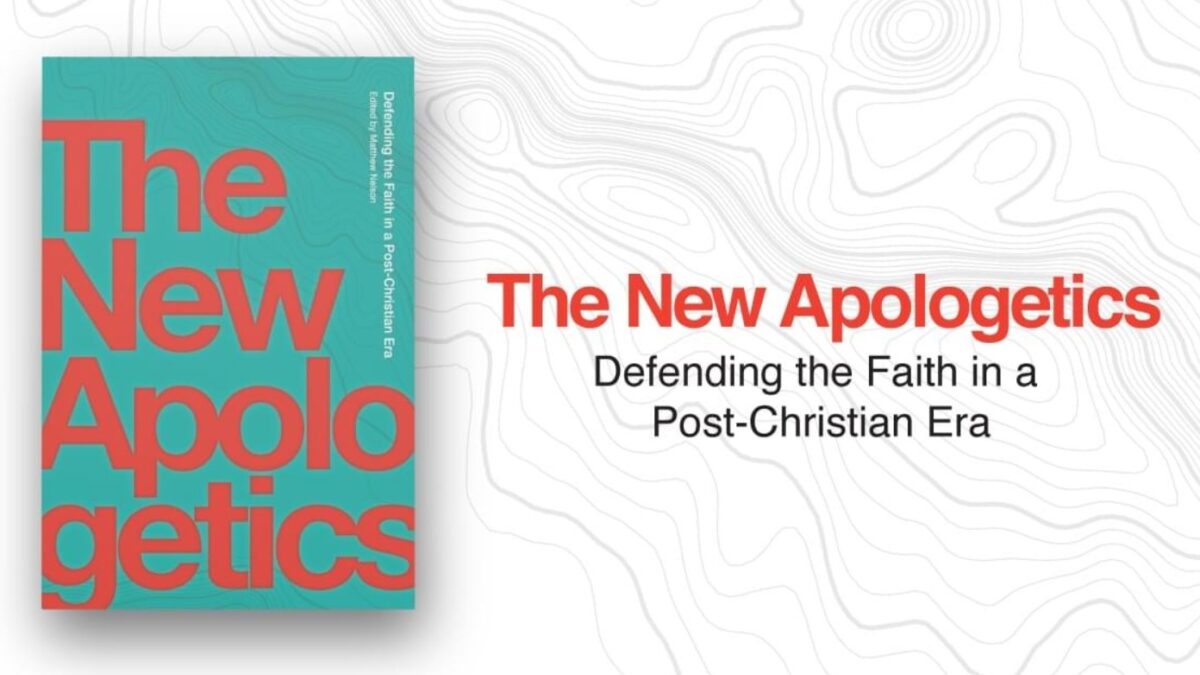There’s perhaps no more difficult time to spread the Christian faith than today. People are raised in a thoroughly secular culture marginalizing religion and substituting it with mindless consumerism, facile materialist dogma, and superficial virtual communities. Their reason, emotions, and empathy are all incapacitated by countless addictions, leaving them insensitive and insensible to the call of the spiritual life. Moreover, they are inundated with bad arguments that leave them confused about physical and metaphysical reality.
This fact is certainly not lost on today’s apologists who make the case for Christ. Unlike apologists of the past who could recite St. Thomas Aquinas’s Five Proofs, point out the logical contradictions of atheists, and call it a day, apologists today are challenged with appealing to the whole person along with confronting the very culture around him. Not only must they present a winning argument that debunks a popular misconception, but they must present a winning set of arguments that debunks a corrupted education and cures the spiritual and intellectual malaise infecting society. Indeed, it’s an effort that requires the apologist’s whole heart, soul, strength, and mind.
Fortunately, such apologists exist, and they have come together to combine their insights in “The New Apologetics,” an anthology of apologetic essays by prominent Catholic thinkers compiled and edited by Matt Nelson, an accomplished apologist in his own right. All of the writers are philosophically trained luminaries who bring an enormous amount of intelligence, experience, and wisdom to the table, offering readers a crash course in persuading the growing number of nonbelievers to convert to the true faith.
True to the Thomistic tradition, the book is carefully organized and logical. It is divided into four main sections: “New Audiences,” which discusses today’s typical skeptic; “New Approaches,” which considers the new ways of reaching people; “New Models,” which describes the unique approaches of famous apologists; and the largest section, “New Issues,” which takes on many present-day critiques to the faith. The knowledge curve gradually ascends as the reader makes it through each section. Most essays in the first half of the book can be read once through with relative ease while the second half of essays will require some more careful reading, especially for those who lack a philosophical or theological background.
And, also in good Thomistic fashion, each section and essay usually share the same logical formulation one finds in the “Summa Theologica”: a proposition, the strongest objections to the proposition, citations of authorities on the proposition, the argument in favor of the proposition, and responses to the objections. And this is all done in 5-7 pages. Even if that sounds restrictive, it leaves room for a wide range of styles and approaches that all succeed in giving a complete treatment of the subject matter without resorting to the usual logical deflections that proliferate on these issues.
Addressing Common Arguments
In line with this, the first section, “New Audiences,” considers propositions made about so-called nones, agnostics, lapsed Christians, moral relativists, and materialists. While there are a few arguments that seem to put people off from religious belief, it’s mainly a matter of lifestyle that encourages a general passivity toward religious ideas and discipline along with a careless narcissism. In his essay “Awakening the Indifferent,” Bobby Angel explains, “When everything is mere preference, opinions, and values clarification, nothing is worth even getting that upset about. An abortion elicits the same response as an ice cream preference: ‘Meh.'”
In addition to Angel’s essay, there are two other notable essays that illustrate the challenge of reaching people today: “Why Catholics Fall Away: A Priest’s Perspective” and “Moral Relativism: Arguments For and Against.” In the first essay, Father Blake Britton sees the modern resistance to Christianity as a product of today’s atheism and decadence: “Every sinful tendency manifested in the culture is nothing more than humanity’s attempt to fill the existential void only faith can fill.” In “Moral Relativism,” Francis Beckwith efficiently dismantles two common arguments against objective morality: The first asserts that disagreements on morality disprove the very reality of morality, and the second asserts that upholding one system of morality and rejecting others is intolerant and thus immoral.
Following this, the essays in the second section, “New Approaches,” consider the most effective techniques in persuasion in a digital world. Some of the essays discuss ways of harnessing the power of new media and adapting old ideas to new techniques while other essays emphasize a new way of thinking about apologetics altogether. Holly Ordway’s “Truth, Meaning, and the Christian Imagination” identifies the challenge of infusing new meaning into words that have become obsolete in the modern mind: “When we evangelize, terms that we use such as ‘salvation,’ ‘grace,’ ‘sin,’ and so on are often mere jargon-words for our interlocutors.” Hence, the apologist is not only developing and proving the Christian position but recreating and reimagining a Christian culture imbued with its own meaning.
In contrast to the first two sections which look at the present and the future, the third section, “New Models,” looks to the past, examining the great communicators of the Christian faith. Many of the names will be familiar to most Christians today — G.K. Chesterton, C.S. Lewis, and St. Augustine of Hippo — while some should become more familiar, such as Blaise Pascal, Rene Girard, and Joseph Ratzinger (Pope Emeritus Benedict XVI). All of them have made important contributions to Christian apologetics.
All the essays in this section touch on the methods and approaches of each apologist, all of which vary widely, but nonetheless have the same goal. “Socrates” by Catholic Answers host and veteran debater Trent Horn is particularly accessible, practical, and surprisingly deep. In the same style of Socrates, Horn asks questions in order to put the burden of proof on skeptics who rarely have to account for their beliefs. Grant Kaplan’s essay on Rene Girard succeeds for opposite reasons, soaring into abstractions while nonetheless making it concrete and meaningful for modern audiences: “Girard develops a theory of the human being as driven by mimetic desire, and unites the human sciences … with a single theory that explains both interpersonal and group dynamics.”
With the foundation set, the final section of the book tackles today’s controversies. This section is divided into four subsections: “Science and Faith,” “Psychology and Anthropology,” “Theology and Philosophy,” and “Atheism and Culture.” While most of the essays are successful in arguing their point, a couple of essays suffer from being too technical and/or condensed, specifically “The Quantum Revolution and the Reconciliation of Science and Humanism” and “Free Will and Its Challenges from Neuroscience.” The former essay becomes bogged down in so many advanced concepts in physics while the latter essay seems forced to conclude before it can delve into the relevant points of its topic.
Yet, even these two essays are fine in their own right. It’s just that they are placed next to much better essays written by some of the sharpest philosophical thinkers in the country: Ryan T. Anderson, Edwards Feser, Jimmy Akin, Christopher Kaczor, and Matthew Petrusek.
All of them play to their specialty, offering a new way of thinking about a well-known problem. In “Anthropological Fallacies,” Anderson discusses the underlying misconception that drives most of today’s controversial movements, from abortion to transgenderism: “The ‘real me’ is something other than my physical body; there’s a real me either to be discovered or created … then my body should be transformed to align with … the inner (real) me.” In “New Challenges to Natural Theology,” Feser suggests that modern society breaks with reason as it embraces critical theory and the ethics of the sexual revolution.
Akin ponders the evolution of communication in “The Fourth Age of Communication,” envisioning a future with “the transmission of information using a brain-machine interface.” Kaczor rebuts popular arguments that religion is simply a product of evolution or cheap wish-fulfillment from sad, lonely human beings. And Petrusek deconstructs woke culture in “Wokeness and Social Justice,” explaining its dynamics and prevalence among today’s intelligentsia.
There are also exceptional essays from less familiar names, such as Fr. Anselm Ramelow and Jennifer Frey. Ramelow illustrates in “The Threefold Way” the three steps that lead the mind “to a deeper encounter with God”: First, one comes to believe in the order and structure of the cosmos; second, he understands God as an entity beyond creation; finally, he believes God exists in a way surpassing all other existence. Frey takes on the popular notion that happiness is completely subjective in her essay “Happiness and the Meaning of Life,” arguing that “we don’t just want to feel good; we want what is good.” This in turn connects the kind of happiness that only the church can give.
Authentic Christian Intellectualism
Overall, it’s a rich collection of essays that is beautifully formatted and edited. It features so many brilliant voices who are at the top of their game and does so in a way that covers every major hang-up with Christianity. Those who already believe will feel strengthened and inspired, while those who don’t will have to confront their own reasons for doubt — or, at the very least, they will have to respect Christianity as a rational proposition in its own right.
Just as important as the content of arguments is the style in which they’re articulated. It’s all very good writing, clear and concise yet well-developed and profound. Besides being enjoyable to read, the essays are great models for budding writers to follow.
If “The New Apologetics” had any weakness, it would probably be that the book is occasionally too slick and sophisticated. There are moments where the writers seem more interested in cultivating a respectable image than challenging the skeptic. This is most obvious in “Ecumenical Apologetics” by Archbishop Donald Bolen, which celebrates the inconclusive though pleasant dialogues religious leaders have with one another. In a similar fashion, some of the other writers tend to concede too much to the other side in the hopes of charming them to the faith. While a few people might appreciate the subtle graciousness, many more will require a bit more bluntness and shame.
However, on the whole, “The New Apologetics” is an excellent book for all audiences. It succeeds in what it sets out to accomplish, equipping readers with the tools for talking about their faith in a compelling and logical manner. Moreover, it does so without being boring, pedantic, or patronizing. It’s a smart, sincere treatment of today’s most important conversations and a great introduction for the person looking to take on deeper ideas. Hopefully, enough people will read it so that today’s barren intellectual and spiritual landscape can bear a little more fruit and restore an authentically Christian intellectual culture.









